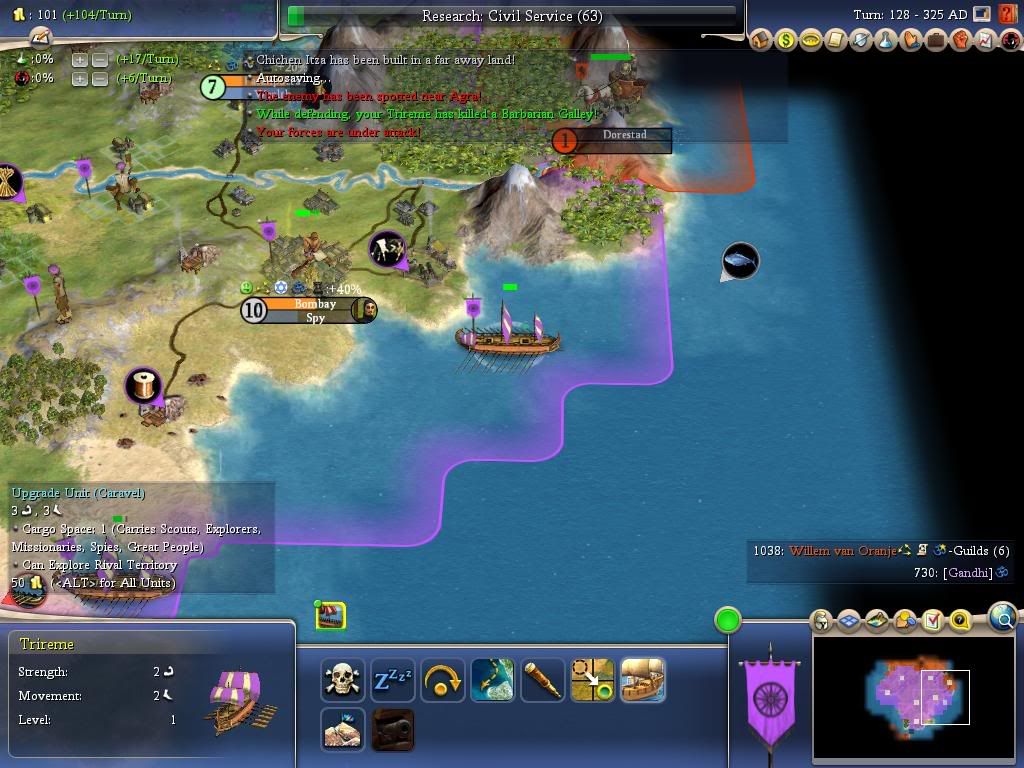OK, seems that I should continue the tread before I forget it

I’ve never left a thread unfinished so I promise to finish it before CIV 5. And maybe I’ll have time to post a Toku one before it’s too late.
Very sorry for the delay but you know real life is as easy as a game in Civ, but after having read some battle reports which had lasted for over a year, I admit I felt much better. But still sorry for Lynxx

----------------------------------------------------------------------------------
So let’s back to the game with some reminders of our philosophy about a normal rhythm I call
Renaissance Expansion. (I thought this terms was only used by Asian players but I don't think people in CFC will have difficulty to understand it.)
We have stepped into 1AD (turn 115) and the most fortunate thing is I’m still alive. I seem 1AD, if not several turns earlier, as a beginning of a new era, both to
human player and to
AI.
For the
human player, at the beginning of this new phase of the game, we have normally completed the upper Classic tech tree (Monarchy, CoL, Maths, Currency, etc.) and obtained at least one of the Middle-Ages techs (CS, Feudalism, Philo). That means after a long and usually painful opening (t0-t100), we have finally settled down, grown some crucial cottages, started to gain money from our precious foreign trade roads and resource trades, getting ready to lightbulb the road to Liberalism.
The lightbulbing is worth a special mention. Firstly, it seems to be the most lucrative beakers in whole game, allowing with a 100-300GP-cost GS to bulb a 1000-1600 beakers’ tech (Philo, Paper, Education, Printing or Astronomy). Moreover, the beakers are cheap and FAST. A GM may make the same amount of beakers with 900-1300 gold but it can’t be converted in one turn. Time should be considered as a COST: yes, we’re not only talking about obtaining the techs but obtaining them BEFORE the others.
Techs are important in this particular era (turn 100-200) I called Control period. Let me explain in detail.
As for
AI, situation is quite different in this period. Wars before turn 100 are seldom considered decisive – let’s see what they can obtain: good land (but cottages can’t be decently developed), some early wonders (the GLH is good, the Pyramid is not bad as well and the Oracle or GW seem out) or an early Shrine at the very best. After Feudalism which shall appear at exactly around t100 in Deity however, AI gains new power from vassaling, voluntary or not, the others. Needless to say, vassal state(s) and their land strengthen their economic and military power. That’s usually how most of the undefeatable monsters are created.
Good news is AI prioritizes Feudalism and Engineering very very much - Longbows and Castles hinder a great deal the early Vassaling of another. Bad news is it’s not always working. Human player is supposed to balance the game before it's out of CONTROL, but in a particular playstyle of Cuirassier/Cannon/Rifle expansion, he doesn't keep a powerful military force to get involved in the war. Therefore, techs become the most powerful weapon we have: to bribe the other AIs to hinder the best one, or to bribe the best rival to slow down his vassaling, or to provide the weak AI with powerful techs. This is what I call
Control: player should be the essential factor to balance the different powers and ensure all of them are in your control.
Civ 4 is 50% about self development and 50% about diplomacy. In the first 100 turns we’ll mostly handle the first subject, and in the following 100 turns it’s about how to get the game in control. When we realize it, we’ll find a surprising coincidence here: the first techs valuable enough alone for bribery of DoW are exactly
Philosophy /CS /Feudalism. That is the mechanism of the game.
I don’t mean if you don’t have any tech advantage at the middle of the game, we’ll certainly lose it. Techs advantages are the best way, at least in this playstyle, to reduce the uncertainty of the game by limiting your rivals. Less risk = more chance to win, we’ll return to this function.
Some may argue that the early stage of expansion and development (at the starting 100 turns) is much more important than this so-call Control period (t100-200). It’s reasonable to some extent. Deity beginners would probably face the main problem with their peacemonger skills (expansion and development in the early 100 turns) even with a fantastic land, but advanced Deity players, as those who have participated in this discussion above, are unlikely to have serious expansion difficulties. Given a good land (or a very bad one), they may have different early strategies that lead to the same result sooner or later, but in a general situation, I reckon, that’s the latter game that makes the real difference.
 .
. .
.
 Thank you for setting an example of an ordinary playstyle in this game! Your skills are really impressive and you show some new dimensions for me.
Thank you for setting an example of an ordinary playstyle in this game! Your skills are really impressive and you show some new dimensions for me. 



